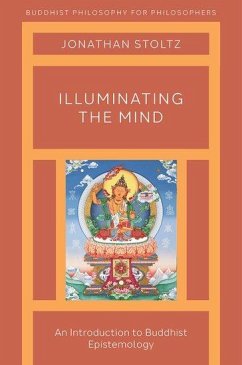- Broschiertes Buch
- Merkliste
- Auf die Merkliste
- Bewerten Bewerten
- Teilen
- Produkt teilen
- Produkterinnerung
- Produkterinnerung
This work provides an introduction to the Buddhist tradition of epistemology. Designed for readers whose background training is primarily grounded in "Western" philosophy, this book presents a range of core topics from the Buddhist tradition of epistemology and puts those topics in conversation with contemporary trends in epistemology
Andere Kunden interessierten sich auch für
![The Primacy of Metaphysics The Primacy of Metaphysics]() Christopher PeacockeThe Primacy of Metaphysics40,99 €
Christopher PeacockeThe Primacy of Metaphysics40,99 €![The Importance of Being Rational The Importance of Being Rational]() Errol LordThe Importance of Being Rational36,99 €
Errol LordThe Importance of Being Rational36,99 €![The Epistemic Role of Consciousness The Epistemic Role of Consciousness]() Declan SmithiesThe Epistemic Role of Consciousness42,99 €
Declan SmithiesThe Epistemic Role of Consciousness42,99 €![The Aesthetic Mind The Aesthetic Mind]() The Aesthetic Mind70,99 €
The Aesthetic Mind70,99 €![The Normativity of Rationality The Normativity of Rationality]() Benjamin KiesewetterThe Normativity of Rationality41,99 €
Benjamin KiesewetterThe Normativity of Rationality41,99 €![The Metaphysics of Representation The Metaphysics of Representation]() J Robert G WilliamsThe Metaphysics of Representation36,99 €
J Robert G WilliamsThe Metaphysics of Representation36,99 €![The Unity of Perception The Unity of Perception]() Susanna SchellenbergThe Unity of Perception41,99 €
Susanna SchellenbergThe Unity of Perception41,99 €-
-
-
This work provides an introduction to the Buddhist tradition of epistemology. Designed for readers whose background training is primarily grounded in "Western" philosophy, this book presents a range of core topics from the Buddhist tradition of epistemology and puts those topics in conversation with contemporary trends in epistemology
Hinweis: Dieser Artikel kann nur an eine deutsche Lieferadresse ausgeliefert werden.
Hinweis: Dieser Artikel kann nur an eine deutsche Lieferadresse ausgeliefert werden.
Produktdetails
- Produktdetails
- Verlag: Oxford University Press
- Seitenzahl: 280
- Erscheinungstermin: 2. April 2021
- Englisch
- Abmessung: 236mm x 157mm x 25mm
- Gewicht: 612g
- ISBN-13: 9780190907549
- ISBN-10: 0190907541
- Artikelnr.: 61214395
- Herstellerkennzeichnung
- Libri GmbH
- Europaallee 1
- 36244 Bad Hersfeld
- gpsr@libri.de
- Verlag: Oxford University Press
- Seitenzahl: 280
- Erscheinungstermin: 2. April 2021
- Englisch
- Abmessung: 236mm x 157mm x 25mm
- Gewicht: 612g
- ISBN-13: 9780190907549
- ISBN-10: 0190907541
- Artikelnr.: 61214395
- Herstellerkennzeichnung
- Libri GmbH
- Europaallee 1
- 36244 Bad Hersfeld
- gpsr@libri.de
Jonathan Stoltz is a professor of philosophy at the University of St. Thomas (Minnesota) where he has been teaching since 2006. His scholarly research is focused on the areas of epistemology and the philosophy of logic, both in the 'Western' tradition and in the Indian and Tibetan traditions of philosophy.
Preface
Chapter 1: Preliminaries
1. Two Histories
2. Core Terms and Concepts
3. Pramana
4. The Episodic Nature of Cognition/Knowledge
5. Main Themes of the Book
Chapter 2: Knowledge
1. Defining Knowledge?
2. Revealing the Unknown
3. Non-deceptive Cognition
4. Analytic Theories of Knowledge and 'The Standard Analysis'
5. Pramana and Reliabilism
Chapter 3: Perception
1. Perception and Non-conceptual Awareness
2. Perceptual Judgment
3. Four Types of Perception
4. Reflexive Perception and Self-awareness
5. Perception, Illusion, and Hallucination
Chapter 4: Inference
1. Two Forms of Inference
2. Inference and Conceptual Cognition
3. The Structure of Inferential Reasoning
4. Evidence and Entailment
5. Epistemic Closure
Chapter 5: Testimony
1. The Nyaya Account and the Buddhist Response
2. Reductive and Non-reductive Theories of Testimonial Knowledge
3. Speakers, Hearers, and Knowledge
4. The Transmission Theory of Testimony
Chapter 6: Ignorance
1. Mistaken Cognition
2. Ignorant Perception
3. Ignorant Veridical Conception
Chapter 7: Skepticism
1. Skepticism and Skeptical Scenarios
2. Knowledge and Instruments of Knowledge
3. Nagarjuna and the Epistemic Regress Problem
4. The Structure of Knowledge
Chapter 8: Sensitivity and Safety
1. Knowledge, Perception, and Inference
2. Tracking and Sensitivity
3. Safety and Knowledge
4. Discrimination and Alternatives
Chapter 9: Internalism and Externalism
1. The Etiology of Cognition
2. Analyzing Knowledge and Internalism
3. Intrinsic vs. Extrinsic Determination of Knowledge Status
4. Factive Mental Episodes and Externalism
Chapter 10: Experimental and Cross-cultural Epistemology
1. Philosophical Intuitions and Experimental Epistemology
2. Cross-cultural Intuitions about Knowledge
3. The Value of Buddhist Epistemology
Notes
Bibliography
Index
Chapter 1: Preliminaries
1. Two Histories
2. Core Terms and Concepts
3. Pramana
4. The Episodic Nature of Cognition/Knowledge
5. Main Themes of the Book
Chapter 2: Knowledge
1. Defining Knowledge?
2. Revealing the Unknown
3. Non-deceptive Cognition
4. Analytic Theories of Knowledge and 'The Standard Analysis'
5. Pramana and Reliabilism
Chapter 3: Perception
1. Perception and Non-conceptual Awareness
2. Perceptual Judgment
3. Four Types of Perception
4. Reflexive Perception and Self-awareness
5. Perception, Illusion, and Hallucination
Chapter 4: Inference
1. Two Forms of Inference
2. Inference and Conceptual Cognition
3. The Structure of Inferential Reasoning
4. Evidence and Entailment
5. Epistemic Closure
Chapter 5: Testimony
1. The Nyaya Account and the Buddhist Response
2. Reductive and Non-reductive Theories of Testimonial Knowledge
3. Speakers, Hearers, and Knowledge
4. The Transmission Theory of Testimony
Chapter 6: Ignorance
1. Mistaken Cognition
2. Ignorant Perception
3. Ignorant Veridical Conception
Chapter 7: Skepticism
1. Skepticism and Skeptical Scenarios
2. Knowledge and Instruments of Knowledge
3. Nagarjuna and the Epistemic Regress Problem
4. The Structure of Knowledge
Chapter 8: Sensitivity and Safety
1. Knowledge, Perception, and Inference
2. Tracking and Sensitivity
3. Safety and Knowledge
4. Discrimination and Alternatives
Chapter 9: Internalism and Externalism
1. The Etiology of Cognition
2. Analyzing Knowledge and Internalism
3. Intrinsic vs. Extrinsic Determination of Knowledge Status
4. Factive Mental Episodes and Externalism
Chapter 10: Experimental and Cross-cultural Epistemology
1. Philosophical Intuitions and Experimental Epistemology
2. Cross-cultural Intuitions about Knowledge
3. The Value of Buddhist Epistemology
Notes
Bibliography
Index
Preface
Chapter 1: Preliminaries
1. Two Histories
2. Core Terms and Concepts
3. Pramana
4. The Episodic Nature of Cognition/Knowledge
5. Main Themes of the Book
Chapter 2: Knowledge
1. Defining Knowledge?
2. Revealing the Unknown
3. Non-deceptive Cognition
4. Analytic Theories of Knowledge and 'The Standard Analysis'
5. Pramana and Reliabilism
Chapter 3: Perception
1. Perception and Non-conceptual Awareness
2. Perceptual Judgment
3. Four Types of Perception
4. Reflexive Perception and Self-awareness
5. Perception, Illusion, and Hallucination
Chapter 4: Inference
1. Two Forms of Inference
2. Inference and Conceptual Cognition
3. The Structure of Inferential Reasoning
4. Evidence and Entailment
5. Epistemic Closure
Chapter 5: Testimony
1. The Nyaya Account and the Buddhist Response
2. Reductive and Non-reductive Theories of Testimonial Knowledge
3. Speakers, Hearers, and Knowledge
4. The Transmission Theory of Testimony
Chapter 6: Ignorance
1. Mistaken Cognition
2. Ignorant Perception
3. Ignorant Veridical Conception
Chapter 7: Skepticism
1. Skepticism and Skeptical Scenarios
2. Knowledge and Instruments of Knowledge
3. Nagarjuna and the Epistemic Regress Problem
4. The Structure of Knowledge
Chapter 8: Sensitivity and Safety
1. Knowledge, Perception, and Inference
2. Tracking and Sensitivity
3. Safety and Knowledge
4. Discrimination and Alternatives
Chapter 9: Internalism and Externalism
1. The Etiology of Cognition
2. Analyzing Knowledge and Internalism
3. Intrinsic vs. Extrinsic Determination of Knowledge Status
4. Factive Mental Episodes and Externalism
Chapter 10: Experimental and Cross-cultural Epistemology
1. Philosophical Intuitions and Experimental Epistemology
2. Cross-cultural Intuitions about Knowledge
3. The Value of Buddhist Epistemology
Notes
Bibliography
Index
Chapter 1: Preliminaries
1. Two Histories
2. Core Terms and Concepts
3. Pramana
4. The Episodic Nature of Cognition/Knowledge
5. Main Themes of the Book
Chapter 2: Knowledge
1. Defining Knowledge?
2. Revealing the Unknown
3. Non-deceptive Cognition
4. Analytic Theories of Knowledge and 'The Standard Analysis'
5. Pramana and Reliabilism
Chapter 3: Perception
1. Perception and Non-conceptual Awareness
2. Perceptual Judgment
3. Four Types of Perception
4. Reflexive Perception and Self-awareness
5. Perception, Illusion, and Hallucination
Chapter 4: Inference
1. Two Forms of Inference
2. Inference and Conceptual Cognition
3. The Structure of Inferential Reasoning
4. Evidence and Entailment
5. Epistemic Closure
Chapter 5: Testimony
1. The Nyaya Account and the Buddhist Response
2. Reductive and Non-reductive Theories of Testimonial Knowledge
3. Speakers, Hearers, and Knowledge
4. The Transmission Theory of Testimony
Chapter 6: Ignorance
1. Mistaken Cognition
2. Ignorant Perception
3. Ignorant Veridical Conception
Chapter 7: Skepticism
1. Skepticism and Skeptical Scenarios
2. Knowledge and Instruments of Knowledge
3. Nagarjuna and the Epistemic Regress Problem
4. The Structure of Knowledge
Chapter 8: Sensitivity and Safety
1. Knowledge, Perception, and Inference
2. Tracking and Sensitivity
3. Safety and Knowledge
4. Discrimination and Alternatives
Chapter 9: Internalism and Externalism
1. The Etiology of Cognition
2. Analyzing Knowledge and Internalism
3. Intrinsic vs. Extrinsic Determination of Knowledge Status
4. Factive Mental Episodes and Externalism
Chapter 10: Experimental and Cross-cultural Epistemology
1. Philosophical Intuitions and Experimental Epistemology
2. Cross-cultural Intuitions about Knowledge
3. The Value of Buddhist Epistemology
Notes
Bibliography
Index








